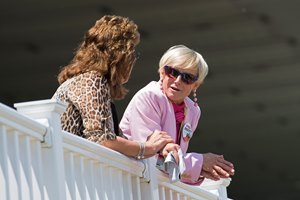Hall of Fame Puts on 'Women in Racing' Panel


As a prelude to a major exhibition that will open next year, the National Museum of Racing and Hall of Fame held a "Women in Racing" panel Aug. 19 in Saratoga Springs, N.Y.
Beginning with a video that recalled racing luminaries like Mary Hirsch, Elizabeth Daingerfield, Allaire du Pont, and Marion du Pont Scott, the panel featured women across the Thoroughbred racing industry, including jockeys, trainers, breeders, and executives.
Originally slated to be moderated by Charlsie Cantey, who was unable to attend for medical reasons, the discussion was instead hosted by Tracy Egan, the executive director of the New York Thoroughbred Breeding and Development Fund.
Two of the panelists, jockey Julie Krone and trainer Janet Elliott, comprise half of the women inductees into the Hall of Fame. Joining them on the panel were champion steeplechase jockey Blythe Miller Davies, trainer Linda Rice, owner/breeder Charlotte Weber, racetrack owner Stella Thayer, and racing analyst Gabby Gaudet.
Asked about both their professional and personal lives, the panelists offered animated anecdotes about their parents' reactions to their career choices, their favorite moments in racing, and their experiences with sexism.
The latter topic was initially prompted by a question from John Hendrickson, the museum's president. His wife Marylou Whitney was present and honored with a bouquet of her namesake roses.
While the panelists acknowledged that it was hard to break into the industry as a woman, many also said that persistence and hard work were the keys to their success.
Acknowledging she, too, was often reluctant to ride women early in her career, Rice told a story of the first time Krone, at that time a well-established jockey, rode for her, on a horse named Fabulous Force, who was notoriously difficult to control.
"If you tried to restrain him," Rice said, "he'd run faster."
Krone breezed Fabulous Force once, and, satisfied, Rice named her in the horse's next race. Fabulous Force ran wide and nearly ran off, but Krone got him to the wire for his first win and set a new track record at Saratoga Race Course.
"Julie crawled off the horse," Rice recalled. "She whispered, 'He ran great.'"
The night before the panel, a new statue of Krone was unveiled in a private ceremony at the museum, and it was she, ebullient and loquacious, perfectly at home in front of the microphone, who often commanded attention Sunday. She regaled the packed Hall of Fame with stories of the strategies she used to get rides early in her career and the feeling she would get on race day, when she knew she had a slate of live mounts.
Several of the women on the panel spoke of the paucity of women involved in racing when they were starting out, asserting that those days are gone.
"There weren't many women at the track when I became involved," said Thayer, who owns Tampa Bay Downs and noted the number of women in management positions at her track. "That has significantly changed and improved at all levels."
"It took me a long time to get accepted to The Jockey Club, and it's a great honor," said Weber, who owns Florida's Live Oak Plantation. "Today it's not quite so difficult. Women are recognized as equals to men. The stigma is over."
The women were also asked about how they plan for the retirement of the horses in their care, and what advice they would offer to women hoping to work in the industry.
When Rice told her father she was going to be a trainer, she said his response was, "It would be easier if you were one of my sons," and Rice said frankly that the current state of racing makes it difficult for anyone to have success, given the smaller foal crop, short fields, and level of competition. Pointing to Gaudet, an on-air race analyst and handicapper, she also observed that women have options other than working on the backstretch.
"Being a trainer is tough," Rice said. "But there are so many other things women can do."
